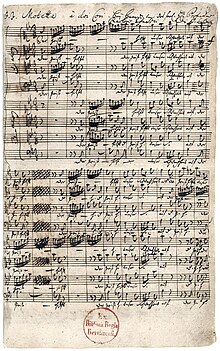BWV 226: Der Geist hilft unser Schwachheit auf (The Spirit helps in our weakness) is the latest subject of my Bach motet "kick." Motets musically can be very tricky to pin down, but I realized in the past day that as J.S. defines them, they are entirely choral cantatas (no recitatives or arias). This particular one bases itself on one of my favorite biblical texts, Romans 8:26-27. As follows, it adheres to a basic structure:
1. Der Geist hilft unser Schwachheit auf: The Spirit gives aid to our weakness. For we do not know for what we should pray, what is proper; but the Spirit itself intercedes for us in the best way with unutterable sighs.
"Geist," being "spirit" of course, is text-painted with a lot of breath - melismas! Tossing the opening figure across the room at one another, the two choirs illustrate "helping" one another out. In the following idea, Bach brings in a fugal entrance pattern to show the Spirit "interceding" for us, with layer upon layer of parts standing in the way. Lastly, at "with unutterable sighs," the double chorus is reduced to one SATB group, and the choppy, syncopated and highly chromatic entrances mimic a sighing motion between the parts.
2. Der aber die Herzen forschet: He, however, who examines hearts, He knows what the Spirit's intention is, since it intercedes for the saints according to that which pleases God.
Here, Bach utilizes one of his favorite "blended" musical style devices: the stile antico fugue, drawn upon in other places to demonstrate a "standard," as in the BWV 232 "Credo" fugue. Examining something indicates that there must be some kind of "law" or canon against which to measure it. Also, the "intercession" of choral entrances is aptly applied, and melismas of laughing breath occur on the word for "saints" ("Heiligen"), perhaps denoting the souls or spirits which are in heaven. Divisions of two frequently indicate the believer's dual natures of saint and sinner, and here the measures also seem to be felt in two, with groups of two eighth notes throughout. On earth in the Church Militant, all members are in dire need of intercession because of this duality.
3. Du heilige Brunst, süßer Trost:
Come, holy Fire, Comfort true;
Grant us the will your work to do
And in your service to abide;
Let trials turn us not aside.
Lord, by your power prepare each heart,
And to our weakness strength impart
That bravely here we may contend,
Through life and death to you, our Lord, ascend.Alleluia! Alleluia! (Christian Worship: A Lutheran Hymnal, No. 176)
This is the third verse of the Pentecost chorale "Come Holy Ghost, God and Lord," also categorized under "Invocation" in some contemporary hymnals. What an ingenious pairing. In this verse, the Christian prays to be called, enlightened, sanctified, and kept in the faith by the Holy Spirit.
Have a listen with a good cup of coffee (although the opening alone will startle you awake):
http://www.youtube.com/watch?v=dXxRDkeh4ZY
Translation:
http://emmanuelmusic.org/notes_translations/translations_motets/t_bwv226.htm#pab1_7
And score- you're set!:
http://erato.uvt.nl/files/imglnks/usimg/f/ff/IMSLP04140-Bach_-_BGA_-_BWV_226.pdf
Other sources:
http://www.bach-cantatas.com/VD/BWV226.htm
http://en.wikipedia.org/wiki/Der_Geist_hilft_unsrer_Schwachheit_auf,_BWV_226
Have a listen with a good cup of coffee (although the opening alone will startle you awake):
http://www.youtube.com/watch?v=dXxRDkeh4ZY
Translation:
http://emmanuelmusic.org/notes_translations/translations_motets/t_bwv226.htm#pab1_7
And score- you're set!:
http://erato.uvt.nl/files/imglnks/usimg/f/ff/IMSLP04140-Bach_-_BGA_-_BWV_226.pdf
Other sources:
http://www.bach-cantatas.com/VD/BWV226.htm
http://en.wikipedia.org/wiki/Der_Geist_hilft_unsrer_Schwachheit_auf,_BWV_226

No comments:
Post a Comment